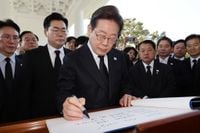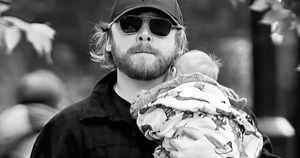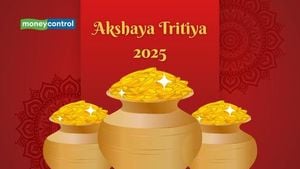In a significant move ahead of the upcoming presidential election, Lee Jae-myung, the Democratic Party of Korea's candidate, visited the Seoul National Cemetery in Dongjak-gu, Seoul, on April 28, 2025. This visit, which took place at 9 AM, was marked by his paying respects at the graves of former Presidents Lee Seung-man, Park Chung-hee, Kim Young-sam, and Kim Dae-jung. With just 36 days remaining until the by-election scheduled for June 3, 2025, Lee is ramping up his campaign focused on unity and economic policies.
Lee’s homage to the tombs of past conservative leaders, particularly those with whom his party has historically had a contentious relationship, signals a strategic shift aimed at attracting centrist and conservative voters. After paying his respects, he attended a meeting of the party's Supreme Council, where he emphasized the importance of the presidential role as one of uniting the people. He stated, "I looked up the meaning of the word 'president' in the dictionary, and it means a leader who unites the people greatly. Even if there is competition, once a representative is selected, it is the president's job to lead the nation along a single path beyond small differences."
In a further effort to broaden his appeal, Lee announced the recruitment of Yoon Yeo-joon, a former Minister of Environment known as a 'conservative strategist,' as the chairman of his campaign's senior committee. Lee remarked, "I asked Yoon to take on the senior position, and he happily accepted. Yoon has always given me advice and guidance." This recruitment is part of Lee's strategy to expand his support base among centrists and conservatives, which he views as crucial for the upcoming election.
Later that afternoon, Lee visited the SK Hynix Icheon Campus in Icheon City, Gyeonggi Province, where he held an 'AI Memory Roundtable' to discuss economic policies. During this event, he unveiled ambitious plans for the semiconductor industry, promising to enact a semiconductor special law, expand tax benefits, establish a semiconductor RE100 infrastructure, and support research and development (R&D) for talent cultivation in the sector. He stated, "These initiatives are essential for strengthening our economy and ensuring that we remain competitive on the global stage."
As Lee Jae-myung prepares for the election, attention is also on the People Power Party, which will announce its presidential candidate on April 29, 2025. The party's selection process will involve a combination of 50% votes from party members and 50% from public opinion polls. If no candidate secures a majority, a runoff will take place between the top two candidates, with a debate scheduled for April 30, followed by voting from May 1 to May 2, 2025. The final candidate will be selected on May 3, 2025.
Speculation is rife regarding the potential candidacy of Han Deok-soo, the former Prime Minister, who is reportedly preparing to enter the race. Reports indicate that he is expected to resign from his current position to focus on his campaign, with his resignation anticipated around April 30 or May 4, 2025. This development has sparked discussions among People Power Party candidates about the possibility of unification with Han, who many see as a strong contender.
Kim Moon-soo, one of the candidates in the People Power Party's primary, expressed his willingness to seek a fair unification with Han if he decides to run, stating, "If Han enters the race, I will promptly meet with him to facilitate a quick and fair unification process." Ahn Cheol-soo, another candidate, echoed this sentiment, emphasizing the need to ultimately select a single candidate through the primary process. Hong Joon-pyo also voiced his commitment to holding multiple debates with Han if he becomes the final candidate, proposing a one-shot public primary.
The urgency of the upcoming election is underscored by the fact that it is a by-election triggered by a presidential impeachment. The registration for candidates is set for May 10 to May 11, 2025, with official campaigning commencing on May 12, 2025. Political parties are already actively engaging in campaign strategies, given the tight timeline.
Lee's approach of courting both conservative and centrist voters reflects a broader strategy to unify the electorate, which he believes is essential in these politically charged times. He stated, "The need and value of unity are higher than ever. Whether it's unity between the left and right or between conservatives and progressives, it may not be easy, but we should strive to find common ground." This sentiment resonates with many voters who are seeking stability and direction as the nation heads into the election.
As the political landscape continues to evolve, all eyes will be on the candidates' performances in the coming weeks, particularly how they navigate the complex dynamics of voter sentiment, party unity, and economic policy. With Lee Jae-myung leading the charge for the Democratic Party of Korea and the People Power Party gearing up for its candidate announcement, the stage is set for a highly competitive and potentially transformative election.
![민주, 상임 선대위원장에 '보수책사' 윤여준 영입[영상]](https://thumbor.evrimagaci.org/ovSxVQGYSYMu1HrBVnLxODyyt90=/200x0/tpg%2Fsources%2Fa20114f7-9e91-44bc-aafd-e2f533acb567.jpeg)




